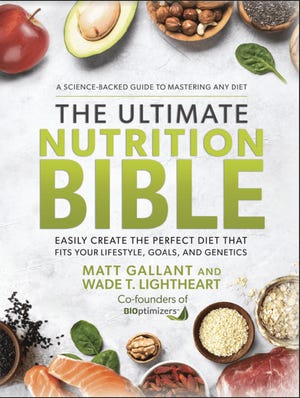We adopt a new diet, start seeing results, then fail to keep the weight off – rinse and repeat. Is this the cycle you are caught in? The Ultimate Nutrition Bible – Co-written by Matt Gallant and Wade Lightheart – reveals why diets fail and how to create one that works.

Losing weight is simple, right? All you have to do is consume fewer calories than your body burns in a day – it’s simple math. Creating a calorie deficit is at the heart of most popular diets – and most people who follow the equation start seeing results early in the process. But maintaining long-term weight loss is the hard part – and studies continue to show that most dieters’ results decline rapidly.
Has your recent diet plan made you feel like a plane taking off, briefly flying through the clouds, and crashing back to earth? You are certainly not alone.
Over the years, we’ve seen many diets come and go in the cultural zeitgeist. Many people yo-yo discover as much as they can learn – trying one, getting the first results, and moving on when the results don’t hold up. One survey even suggests that the average dieter will try a huge 126 fad diets during their lifetime!
This is one of the many topics covered in THE Ultimate Nutrition Bible, poised to become the most comprehensive and unbiased nutrition book ever written. Written by Matt Gallant And Wade Light Heart – the co-founders of BIOoptimizers – the book will help you focus on your specific characteristics and needs and design your own diet based on universal nutritional principles.
When we step back and look at things, it seems that many of us place too much emphasis on diets themselves. To arrive at a solution for lasting, sustainable weight loss, we need to look at the common variable: the dieter. The Ultimate Nutrition Bible was created to assist readers in this work.
“If diet experts are honest,” Lightheart says, “the diet industry has failed. 97% of people who diet end up failing – and they do it for reasons that aren’t discussed. »
These problems are rarely recognized, due to dogma and the fact that it is better to blame the diet rather than the person who failed to maintain results. But there are more nuances here than just saying “your diet has failed because you lack self-control, willpower, etc.
Lightheart cites suboptimal, or genetic, predispositions, and social constructs, as factors in addition to a person’s ability to follow the diet itself. Another common problem occurs when the diet becomes so restrictive that it damages the upstream effects of the system. calories in, calories out model.
The Ultimate Nutrition Bible spend time analyzing these factors. To create a universal guide for those tailoring their diet to their goals, psychology, and genetics, they balance what works among the most common diets, as well as what doesn’t.
While you should pick up a copy of the book to delve deeper into all these reasons why your diet has stopped working, here are a few that commonly plague dieters.
The first is dieting too quickly.
We live in a fast-paced society where we are used to getting what we want immediately. This is what creates the buzz around Transformations in 12 weeks And get ready for the beach, quick plans which continue to disappoint dieters.
Humans evolved to survive, not to diet. When we drastically reduce our calories too quickly, we trigger our starvation self-defense mechanisms. As your brain begins to think that the sharp drop in food intake is a sign of tough times ahead, your metabolism decreases, your hunger increases, and evolutionary alarm bells start telling you to stop dieting.
Other people fall into the trap of choosing an unsustainable diet. They adopt ones that force them to trade the meals they love for foods they hate. Willpower is great, but it takes a special type of person to avoid your favorite foods for the rest of your life. The Ultimate Nutrition Bible is aimed at those looking to lead a healthier life in the long term – so the authors emphasize the importance of designing a diet that fits your lifestyle.
“From the outset,” says Gallant, “ask yourself: “Could I follow this diet until I’m 80 or 90? If the answer is no, then you know it’s not a sustainable diet. »
These factors can be as simple as asking whether you prefer to eat meat or vegetables, and can be as complex as considering how much novelty you need to keep life fresh and exciting.
If your last diet showed great promise before falling off the cliff, perhaps you should spend more time thinking about your needs and psychology in order to create something sustainable.
Another common reason why diets fail has to do with genetics. We all come from different places and our bodies developed based on the conditions of our ancestors. What will work for one will negatively impact another. If you’re genetically a strong fat burner, for example, the ketogenic diet will yield great results, whereas someone with the opposite genes might struggle to get into ketosis in the first place.
Nutrigenomics – the science of nutrition and genes – plays an important role in The Ultimate Nutrition BibleThe approach to building a sustainable diet. Matt Gallant and Wade Lightheart have dedicated years of research to the topic so you can learn more about your personal genetics and discover the nutrition plan that will work for you.
So now that you understand some of the reasons why your last diet failed, how about discovering the one that will serve you for life? Order The Ultimate Nutritional SystemToday.
